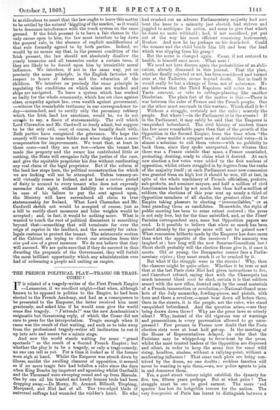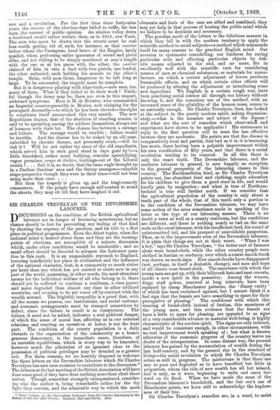- THE FRENCH POLITICAL PLAY—TRAGIC OR TRAGI-
COMIC?
-TT is related of a tragedy-writer of the First French Empire —Lemercier, if we recollect aright—that when, although 'known to be opposed in politics to the Empire, he had been elected to the French Academy, and had as a consequence to 'be presented to the Emperor, the latter received him most graciously, and asked him if he would soon give the world some fine tragedy. " J'attends1" was the new Academician's enigmatic but threatening reply, of which the Ca3sar did not rare to press for the interpretation. Tragic enough when it -came was the result of that waiting, and such as to take away from the professional tragedy-writer all inclination to cat it up into acts and scenes for a mimic stage.
And now the world stands waiting for some "grand 'spectacle" as the result of a Second French Empire ; but -whether the play is to be a tragedy, or only a tragi-comedy, no one can tell as yet. For a time it looked as if the former -were nigh at hand. Whilst the Emperor was struck down by illness, amidst the swelling clamour of opposition, it seemed as if no more tragic fate had befallen a ruler since the days -when King Bomba lay impotent and agonizing whilst Garibaldi and the Thousand were swooping round and up from Marsala. One by one all his trusted and handy human tools had been dropping away,—De Morny, St. Arnaud, Billault, Troplong, ltlocquard, and Niel last of all. The two-edged blade of anivensal suffrage had wounded the wielder's hand. He who
had crushed out an adverse Parliamentary majority had now bent the knee to a minority just elected, had striven and juggled to anticipate its action, and seem to give that which he thirst no more withhold ; had, if not sacrificed, yet put out of the way his most efficient remaining instrument, Rouher. And now he lay perhaps on his death-bed. Could the woman and the child beside him lift and bear the load which was slipping from his grasp ? But the scene is changed again. Ca3sar, if not restored to health, is himself once more. What next ?
We need not here discuss again the probabilities of an abdi- cation, already discussed in this journal. That the plan, whether finally rejected or not, has been considered and turned over at the Tuileries, seems beyond doubt. But in itself it would really be but a change of form, not of substance. No one believes that the Third Napoleon will retire to a San Yuste convent, or take to cabbage.planting like another Diocletian. The plain fact of the matter is this :—There is war between the ruler of France and the French people. One or the other must succumb in this warfare. Which shall it b3 ?
Without a struggle, certainly not the ruler ; scarcely the people. But where ?—in the Parliament or in the streets ? If in the Parliament, it may safely be said that the Emperor is vanquished beforehand. The civil history of modern times has few more remarkable pages than that of the growth of the Opposition in the Second Empire, from the time when "the Five," alone amidst a compact mass of ministerial votes—it is almost a solecism to call them voters—with no publicity to back them, since they spoke unreported, bore witness that there was a France outside that mass, a France unsatisfied, protesting, desiring, ready to claim what it desired. At each new election a few votes were added to the first nucleus of opposition, whilst others straggled in by degrees from the ranks of the majority itself ; at each Parliament some new concession was granted from on high lest it should be won, till at last, in spite of the whole machinery of French officialism, prefects, sub-prefects, and nominee mayors, and half a million of civil functionaries backed by not much less than half-a-million of soldiers, the elections of this year sent up nearly a third of Opposition members of all shades, the greatest cities of the Empire taking pleasure in electing " irreconcilables," or at least parading them as candidates. Meanwhile, the right of public meeting has been to some extent restored ; the press is not only free, but for the time unbridled, and, as the Times' Parisian correspondent says, none but Opposition papers are read. Is it possible to believe that when so much has been gained already by the people more will not be gained now? What concession hitherto made by the Emperor has done more than whet the appetite of the receivers ? His amnesty was laughed at ; how long will the new Senatus-Consultum last Short shrift probably will the elective House give it, if once it meets. Old or young, the Bonapartes cannot face a Parlia- mentary re'gime ; they must crush it or be crushed by it.
But what if the struggle were in the streets ? Why, then the chances might be quite other. Whether it be true or not that at the last Paris riots Niel had given instructions to fire, and Canrobert refused, saying that with the Chassepots too much innocent blood must be shed, certain it is that soldiers armed with the new rifles, fronted only by the usual materials of a French insurrection or revolution,—National-Guard mus- kets of the July monarchy, fowling-pieces, and pistols, with here and there a revolver,—must bear down all before them. Once in the streets, it is the people, not the ruler, who stand vanquished beforehand. And the question arises,—are they being drawn down there ? Why are the press laws so utterly silent? Why, instead of the old vigorous war of warnings and prosecutions, is every provocation allowed to go unre- pressed? Few persons in France now doubt that the Paris election riots were at least half got-up. Is the meeting of the House of Representatives delayed, in order that the Parisians may be whipped-up to fever-heat by the press, whilst the most trusted leaders of the Opposition are dispersed and silent, in order to keep the arena free for some wild rising, headless, aimless, without a rallying-point, without a moderating influence ? That some such plots are being con- trived by the dozen, no one doubts ; reckless fanatics will never be wanting to spin them,—no, nor police agents to join in and denounce them.
Yes, a good street victory might establish the dynasty for five, ten, fifteen years perhaps. But at what price? The
struggle must be one in good earnest. The mere red spectre' has lost its hobgoblin terrors for the nation. The very bourgeoisie of Paris has learnt to distinguish between a row and a revolution. For the first time since forty-nine years, the e'meutes of the election-days failed to ruffle, far less turn, the current of public opinion. An aimless volley down a boulevard would rather irritate than, as in 1851, cow Paris. The men who must be drawn into the streets must be real foes worth getting rid of, such, for instance, as that ourrier before whom the Cassagnac, head bravo of the Empire, lately quailed, when, professing entire ignorance of sword and pistol alike, and not willing to be simply murdered at arm's length with the one or at ten paces with the other, the ouvrier claimed of him in vain a duel with two pistols, one loaded, the other unloaded, each holding his muzzle to the other's temple. Grim, wild men these, dangerous to be left long at large. To be successful, the tragedy must be complete.
But it is dangerous playing with edge-tools,—new ones, too, many of them. What if they failed to do their work Faith- ful though the Army may be, there are, even in this respect, awkward symptoms. Here is M. de Keratry, who commanded an Imperial counter-guerrilla in Mexico, now claiming for the prorogued Assembly—to which he has been elected—the right to constitute itself unconvoked this very month. The new Republican dogma, that of the abolition of standing armies, is said to be spreading among the soldiers themselves, always out of humour with their lot. The chance lies between a carnage and failure. The carnage would be terrible ; failure would be terrible. And the chance has to be risked by an old man, enfeebled by chronic disease, not personally cruel,—will he risk It? Will he not rather try some of the old expedients, which served him in such good stead in days gone by I—a little bloodshed, rather more bullying, oracular speechifying, vague promises, coups de the'citre, trottings-out of the Liberal cousin I . . . Sad it is, no doubt, that the tame eagle brought up in a Carlton Gardens' area and the Satory sausages—valuable stage-properties though they were in their time—will not bear using more than once. . . .
But then the tragedy is given up, and the tragi-comedy commences. If the people have enough sell-control to avoid the streets, they may sit till they have laughed it out.































 Previous page
Previous page